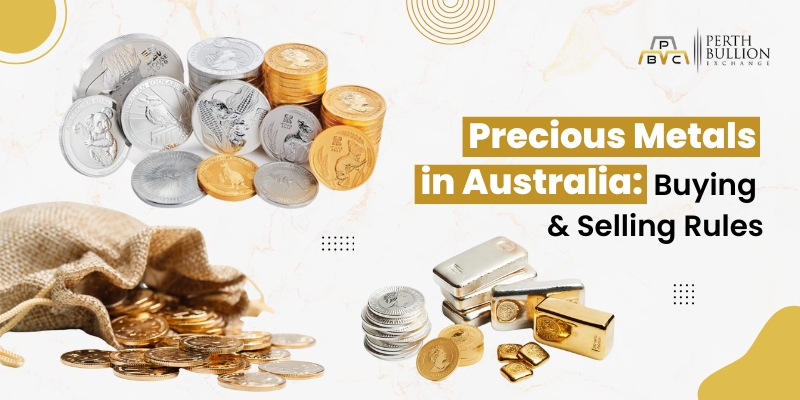Are There Any Restrictions on Buying or Selling Precious Metals in Australia?
Globally, both the investment and trade markets rely on precious metals. Gold, silver, and platinum are some of the most recognised precious metals. With its robust mining and refining process, the Australian economy is a leader in the world market for precious metals.
However, the question arises of whether Australia should impose legal limitations on the transactions of precious metals between buyers and sellers.
Understanding Precious Metals in Australia
Precious metals include rare metals, such as gold, silver, and platinum. The market demands these metals because they serve investment and industrial purposes. Some items, such as jewellery, serve a decorative purpose.
Precious metals market operations in Australia are a significant global market segment. Mining activities for gold and silver occur extensively throughout Western Australia, Queensland, and New South Wales regions of Australia, positioning the country as a top global producer.
Individuals who invest in Australia have multiple options for acquiring precious metals. Investors have different options for acquiring physical bullion bars and coins. Exchange-traded funds (ETFs) for gold and silver can be purchased through transactions with authorised dealers and financial institutions.
Buying Precious Metals in Australia
Before buying precious metals in Australia, you should know certain principles. Consider these before making any precious metal investment:
- Legal Considerations: Australian laws do not prohibit ordinary citizens from purchasing precious metals. Nevertheless, buyers need to follow all financial rules established by Australian government authorities.
- Identification Requirements: Individuals looking to buy vast amounts of precious metals must provide their identification. The Australian legal system demands identification to stop illegal money laundering activities from occurring.
- GST and Tax Implications: Precious metals with investment grade that exceed GST purity thresholds qualify for GST exemption. Capital Gains Tax (CGT) regulations become applicable when profits are made from selling these metals.
Selling Precious Metals in Australia
When talking about the selling of precious metals in Australia, you must also be aware of the following:
- Who Can Sell: The Australian law permits various individuals, including businesses, to sell precious metals. The sale of gold, silver, and other precious metals to dealers and private individuals is available in Australia. Precious metal specialists known as bullion dealers operate a formal marketplace for metal transactions.
- Taxation on Sales: The determination of taxes on selling precious metals depends on how the authorities classify these investments. Investors must maintain proper documentation of their metal purchases and sales for tax purposes to resolve their tax obligations and report any collected gains.
- Reporting Requirements: Precious metals trading in Australia requires strict reporting to authorities, especially for bullion dealers operating in the market. Large sellers must comply with financial laws by providing the relevant authorities with identification details and transaction information.
Importing and Exporting Precious Metals
1. Importing Regulations
Australia has specific guidelines that must be followed when importing precious metals. The importer must declare the large quantities of imported goods to the relevant authorities. The government can monitor the movement of high-value items through this system as part of its effort to prevent illegal activities.
Customs duties apply to specific types of precious metals imported or exported into Australia. Precious metals categorised as investment grade receive tax exemption upon entry into Australia, provided their purity meets or exceeds 99.5%.
Non-investment-grade metals and lower-purity gold or decorative items are subject to additional customs duties and taxes when imported into the country. The Australian Border Force provides importers with the necessary information regarding their regulatory requirements.
2. Exporting Regulations
Australia requires businesses to fulfil particular legal requirements before exporting precious metals from the country. The seller must report large overseas shipments containing gold, silver, or other valuable metals.
The export procedure is subject to the influence of various rules established through international trade agreements. Several nations restrict precious metal imports by implementing stringent documentation requirements that comply with global trade regulations.
Exporters must comply with all regulatory requirements to avoid shipment delays and financial penalties.
Restrictions & Legal Risks When Buying or Selling Precious Metals in Australia
1. Counterfeit and Fraud Prevention
Selecting genuine dealers with certified precious metal products remains crucial during any purchase. Numerous sellers who operate fraudulently attempt to sell counterfeit gold and silver products, which they market as authentic, causing substantial financial damage to customers.
When purchasing precious metals, selecting dealers with Australian authority registration is crucial to avoid scams. Product authenticity becomes more straightforward to verify by inspecting hallmark stamps, serial numbers, and authenticity certificates.
Also, research by reading customer reviews. Additionally, verifying industry certifications, combined with a thorough examination of products, will help prevent the purchase of counterfeit items.
2. Illegal Trading and Smuggling
There are associated risks to participating in unregulated black-market sales of precious metals. The Australian government maintains strict rules to prevent illegal trading activities involving gold and silver smuggling, which aim to evade taxation and circumvent trade limitations. Any person who participates in these transactions becomes vulnerable to severe legal penalties.
Therefore, the buying and selling precious metals must occur through legal channels, and all transaction activities must comply with national legal requirements. Proper documentation and adherence to import and export regulations minimise the risk of legal problems.
3. Penalties for Non-Compliance
The outcome of not following tax laws and the anti-money laundering (AML) framework involves paying costly financial penalties and facing legal penalties. Australian authorities track significant precious metal deals to detect financial crimes.
Individuals evading tax responsibilities or correctly reporting transactions can face criminal prosecution. Knowledge of legal requirements enables investors to prevent paying expensive penalties.
Conclusion
Australian investors and traders must understand all regulations applicable to precious metal transactions. Transaction success depends on following legal requirements while maintaining proper documentation. Individuals seeking to avoid legal issues should conduct their transactions with reputable dealers, adhering to established trading guidelines. Contact trusted dealers like Perth Bullion Exchange now to make a sound investment!




Comments
Post a Comment